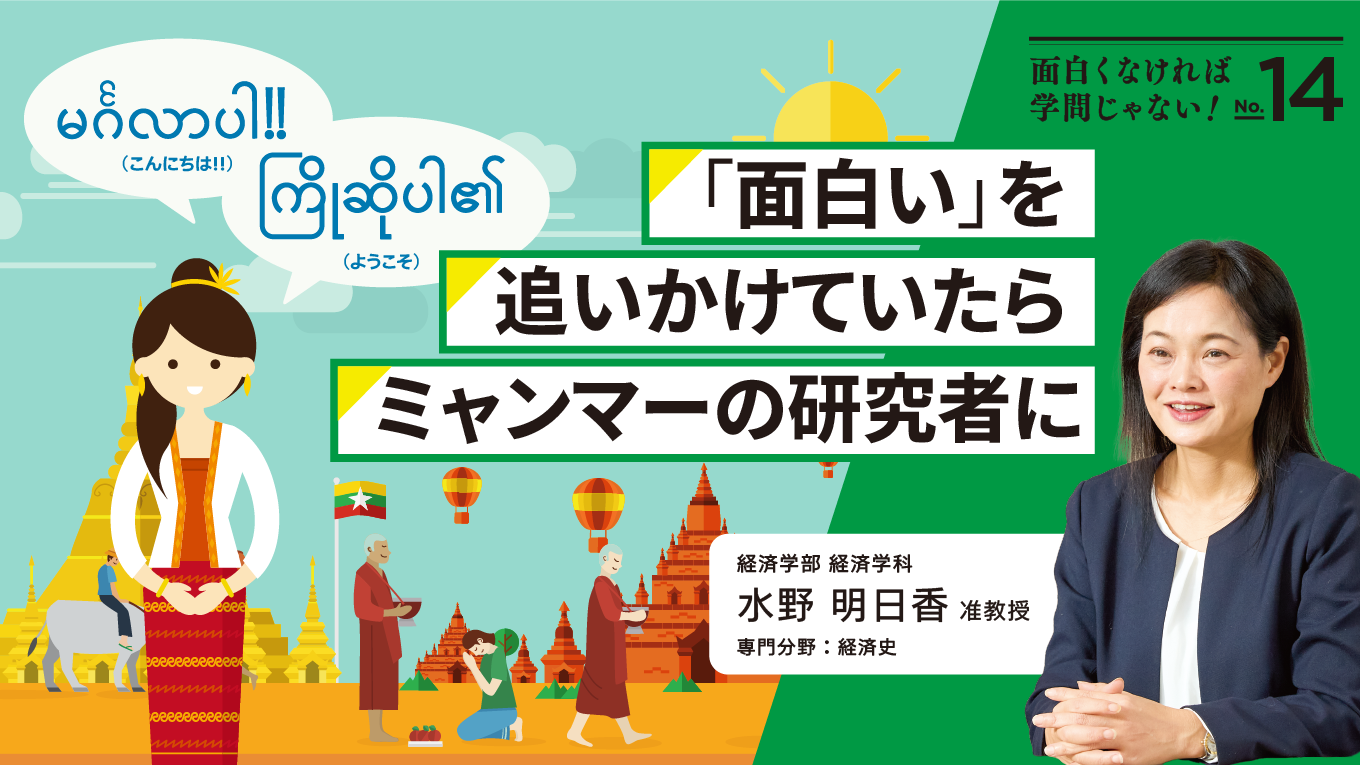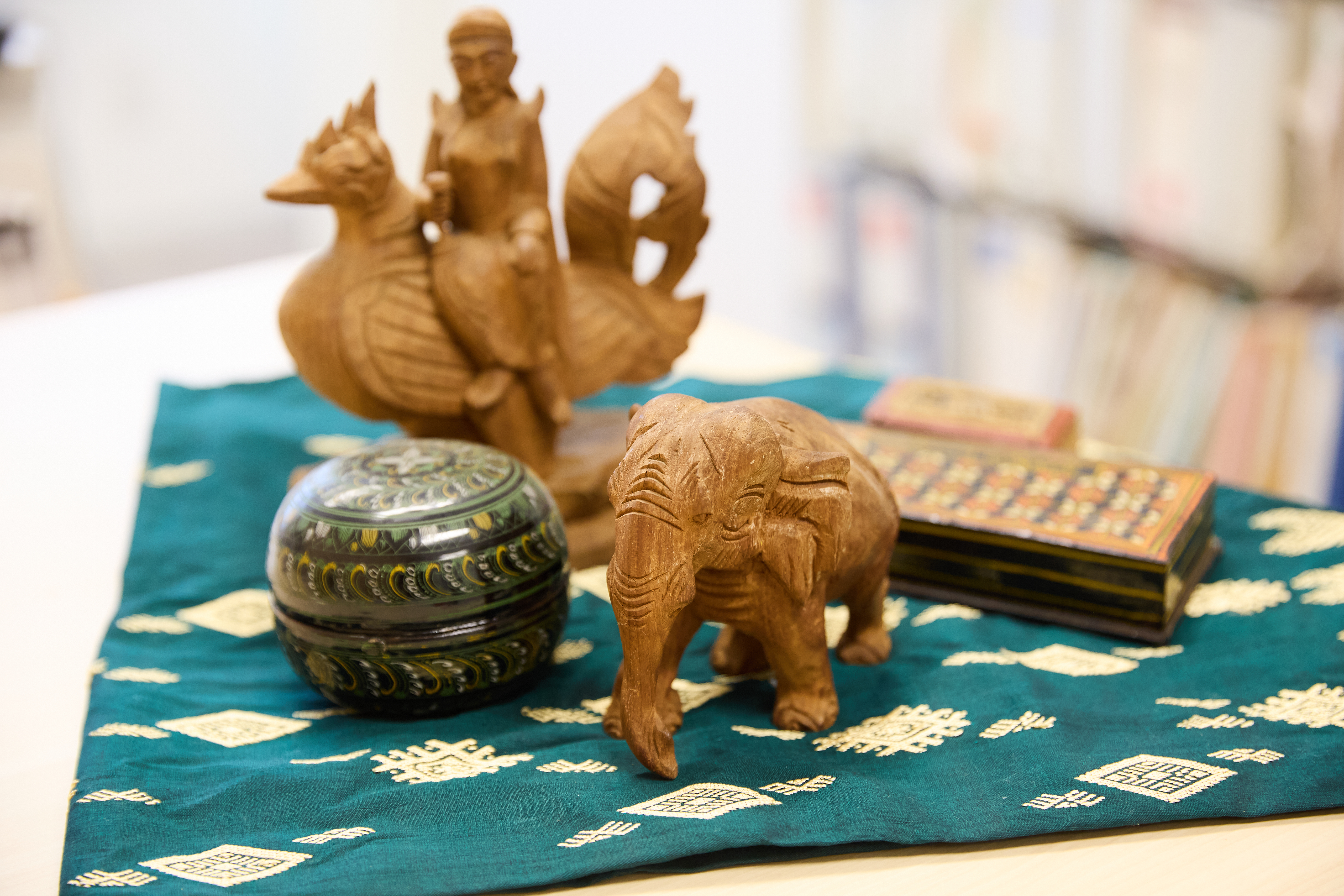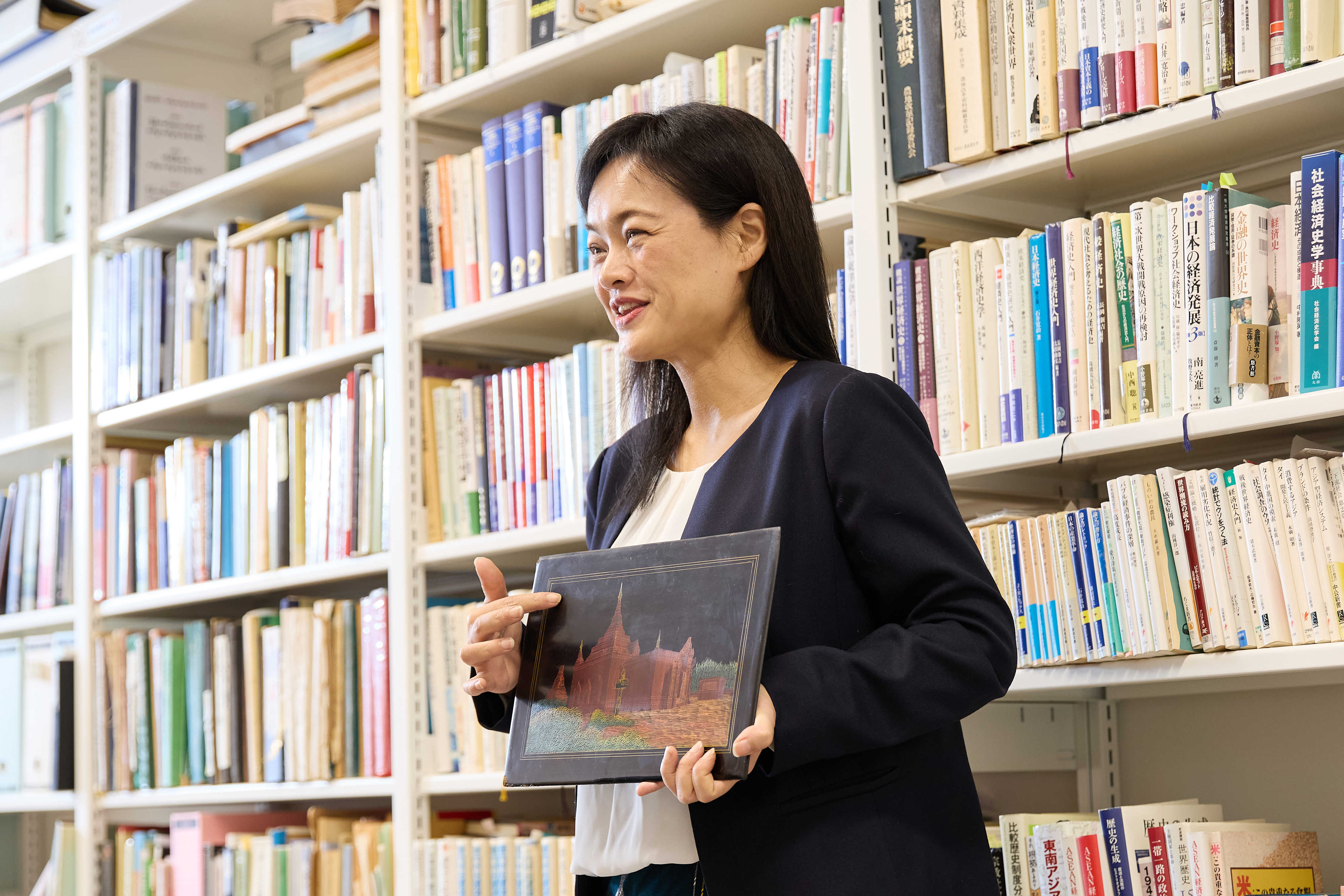
"Interesting"
If you chase after
To Myanmar research
If you chase after
To Myanmar research


#Asia University research
MIZUNO Asuka Associate Professor
Faculty of Economics Department of Economics
2025.07.01
In the series "If it's not interesting, it's not academia!", we introduce research content and anecdotes of faculty members at Asia University. The 14th installment features Associate Professor MIZUNO Asuka of Faculty of Economics, Department of Economics.

Teenagers Overwhelmedby Asia's Vibrancy
At that time, Southeast Asia was entering a new era. For example, Ferdinand Marcos, who had reigned as president of the Philippines for 20 years, was overthrown by the People Power Revolution, and a democratization movement arose in Myanmar, forcing the Ne Win administration to step down. It was also a time when economic growth in Southeast Asian countries such as Thailand and Malaysia was beginning to attract attention, and I was overwhelmed by the power of Asia's dynamism. In such an international situation, I thought that if I learned an Asian language that is still spoken by few people in Japan, it might be useful in the future, so I chose Burmese.
I didn't have such deep thoughts in high school, but now I truly believe that I made the right choice in choosing Burmese language, because it allowed me to have a deeper connection with the local community through Burmese language and to come into contact with the gentle and warm personalities of the local people.
I decided to go to graduate school when I was in Junior of Graduate School, after my first trip to Myanmar and wanting to know more about it. By coincidence, the book I was reading in my seminar at that time was by Furnivall, a leading authority on Southeast Asian history. Furnivall was an Indian civil servant who built his career in Myanmar (British Burma) during the British colonial period in the early 20th century, and he argued that the cause of Myanmar's difficult path after independence lay in the colonial period. For that reason, I majored in economic history in Graduate School.
The history of Myanmar, a rich country

After three wars, Myanmar was incorporated under British colonial rule as a state of British India. During World War II, it was also under the control of the Japanese military. During the British colonial period, Myanmar became the world's largest rice exporter, and was also rich in mineral resources, making it one of the wealthiest states of British India, and was called "one of the greatest jewels in the crown of the Indian Empire."
However, after independence, the economy continued to stagnate, and in 1987 the United Nations decided that the country should be considered a "least developed country." The main reason for this was the failure of Burmese-style socialism (known in English as Burma at the time). The background to the adoption of Burmese-style socialism was Furnivall's historical awareness, which I mentioned earlier. As the economy developed, the Burmese people were unable to adapt to the market economy, and were left behind in rural areas, accumulated debt, and their farmland was handed over to foreigners. Furnivall was already a well-known debater who influenced colonial policy in the 1930s, and through nationalists, he also had a great influence on policies after independence. I was also influenced by Furnivall's writings and began research, but now I am trying to overcome Furnivall's work by reexamining the categories of colonial administrative documents and statistics. I believe that the origins of the central agricultural policy of Burmese-style socialism lie in the policies of the colonial period and under Japanese rule.
In recent years, there have been movements for democratization and economic reform, known in Japan for the activities of Aung San Suu Kyi, but the military coup that took place in 2021 has once again set back Myanmar's path to democratization and economic growth. The military regime no longer has any legitimacy, and with the entanglement of some conglomerates linked to the military and the intentions of other countries, Myanmar's future cannot be said to be bright. It is now difficult for us research to conduct research in Myanmar. However, what I would like many people to know is the gentle personality of the Myanmar people, as I mentioned earlier. During Graduate School years, I studied abroad at the National Center for Historical research at the University of Yangon for two years, and have since traveled there frequently to interact with local people. During my study abroad, I conducted interviews in rural areas where there was no running water or electricity, and found and deciphered old handwritten documents left in the countryside. It was a rather harsh experience, but interacting with the warm Myanmar people I met there helped me forget the hardships of research. Some of the elderly people also remembered the Japanese military during the war, and I was able to talk to them directly. By the way, since the military coup, the number of Myanmar people coming to Japan has been increasing, and last year's data showed that there were about 80,000 Myanmar people living in Japan. I'm sure there are Myanmar people living peacefully in your neighborhood.
A historical perspective is essential to deeply understand the present and see into the future

In the Faculty of Faculty of Economics class "Asian Economic History," we lecture from an economic history perspective on how not only Myanmar but other Asian countries have developed through their relationships with Western countries and Japan, or whether they have missed the wave of development. This is true for Myanmar, but in order to Lecture a deeper understanding of the current situation and economic challenges of other Asian countries, it is very important to know about the colonial period from the 19th century to the first half of the 20th century. Although the content is about "old Asia," we place emphasis on applying this knowledge to gain a perspective that will allow students to understand current events and things close to home.
In the seminar, students find a topic that interests them and work on it for their graduation thesis. The topics of economic history range from relatively serious topics such as industrialization and the international economic order to familiar issues such as family history, environmental history, and public health history, so students can freely choose their topic. In order to find something that interests you, you actually need to study a little, but recently, many students choose a target country based on the country of origin of their colleagues at their part-time job, or their own or their friends' roots. Students choose a variety of topics, but as they proceed with their individual work, a common theme for the entire seminar that reflects the mood of the times gradually becomes apparent. For example, a recent example is "Democratization and Economic Development in Asia." I think that younger people are more sensitive to the atmosphere of the times.
As someone who has research the economic history of Southeast Asia, mainly Myanmar, I would be happy if more students become interested in Southeast Asian countries such as the Philippines, Indonesia, and Vietnam, which have deep ties with Japan both today and historically. In the future, as working adults, you may have the opportunity to interact with people from these countries. I hope that by learning more about Asia at a young age as a university student, you will be able to broaden your own possibilities.
In the seminar, students find a topic that interests them and work on it for their graduation thesis. The topics of economic history range from relatively serious topics such as industrialization and the international economic order to familiar issues such as family history, environmental history, and public health history, so students can freely choose their topic. In order to find something that interests you, you actually need to study a little, but recently, many students choose a target country based on the country of origin of their colleagues at their part-time job, or their own or their friends' roots. Students choose a variety of topics, but as they proceed with their individual work, a common theme for the entire seminar that reflects the mood of the times gradually becomes apparent. For example, a recent example is "Democratization and Economic Development in Asia." I think that younger people are more sensitive to the atmosphere of the times.
As someone who has research the economic history of Southeast Asia, mainly Myanmar, I would be happy if more students become interested in Southeast Asian countries such as the Philippines, Indonesia, and Vietnam, which have deep ties with Japan both today and historically. In the future, as working adults, you may have the opportunity to interact with people from these countries. I hope that by learning more about Asia at a young age as a university student, you will be able to broaden your own possibilities.
It's important to continue thinking even if you don't understand

What I would like to tell high school students and current university students who are thinking about their future career options is to cherish chance encounters and connections. I think the current young generation has been told since childhood to "do what you like" and "find something that interests you." However, it is not something you can find right away by looking for it. It is something that is formed little by little through various daily experiences such as daily schoolwork, interactions with friends, reading, extracurricular activities, and part-time jobs.
Also, cherish that feeling of "I don't understand." We live in an age where you can easily find the "answer" by searching the Internet, but the important things aren't so easy to understand. Wondering why is what sparks your interest and the beginning of the "fun." As you continue to think about it with enthusiasm, you will begin to like it. You may not find the answer right away, but later, when you've forgotten about it, you might suddenly think, "I get it." That will make it even more interesting. The joy that comes after hard work is great.
I myself came across Myanmar by chance, and as I continued to think about it, I gradually began to find it interesting. The work of research is always about challenging things that we don't understand. During my time abroad, I was troubled by typhoid fever and a scorpion (!) appearing in my dorm room. But as long as you think it's interesting, you can manage it.
The four years at university are a time when you have relatively free time to experience many different things and think things through at your own pace. You can also take on challenges that will broaden your world, and I believe that being passionate will help you overcome any difficulties that may come your way. Whether you are a student or after you graduate, please continue doing something until it becomes interesting to you. Humans need to think and learn for life. I hope to continue learning together with the students at Asia University and take on new challenges. Let's do our best together!
Also, cherish that feeling of "I don't understand." We live in an age where you can easily find the "answer" by searching the Internet, but the important things aren't so easy to understand. Wondering why is what sparks your interest and the beginning of the "fun." As you continue to think about it with enthusiasm, you will begin to like it. You may not find the answer right away, but later, when you've forgotten about it, you might suddenly think, "I get it." That will make it even more interesting. The joy that comes after hard work is great.
I myself came across Myanmar by chance, and as I continued to think about it, I gradually began to find it interesting. The work of research is always about challenging things that we don't understand. During my time abroad, I was troubled by typhoid fever and a scorpion (!) appearing in my dorm room. But as long as you think it's interesting, you can manage it.
The four years at university are a time when you have relatively free time to experience many different things and think things through at your own pace. You can also take on challenges that will broaden your world, and I believe that being passionate will help you overcome any difficulties that may come your way. Whether you are a student or after you graduate, please continue doing something until it becomes interesting to you. Humans need to think and learn for life. I hope to continue learning together with the students at Asia University and take on new challenges. Let's do our best together!
Related Links
- Faculty of Economics TOP
- Faculty of Economics Department of Economics Department Introduction
- School of Economics and Business Department of Economics Four Years of Learning
- Faculty of Economics Department of Economics Course Introduction/Course Model
- Faculty Faculty of Economics Department of Economics /Special Lecture
- Faculty of Economics Department of Economics Seminar
- Faculty introduction of Faculty of Economics Department of Economics